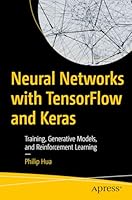
Learn Keras for Deep Neural Networks: A Fast-Track Approach to Modern Deep Learning with Python
- Length: 182 pages
- Edition: 1st ed.
- Language: English
- Publisher: Apress
- Publication Date: 2019-01-30
- ISBN-10: 1484242394
- ISBN-13: 9781484242391
Learn, understand, and implement deep neural networks in a math- and programming-friendly approach using Keras and Python. The book focuses on an end-to-end approach to developing supervised learning algorithms in regression and classification with practical business-centric use-cases implemented in Keras.
The overall book comprises three sections with two chapters in each section. The first section prepares you with all the necessary basics to get started in deep learning. Chapter 1 introduces you to the world of deep learning and its difference from machine learning, the choices of frameworks for deep learning, and the Keras ecosystem. You will cover a real-life business problem that can be solved by supervised learning algorithms with deep neural networks. You’ll tackle one use case for regression and another for classification leveraging popular Kaggle datasets.
Later, you will see an interesting and challenging part of deep learning: hyperparameter tuning; helping you further improve your models when building robust deep learning applications. Finally, you’ll further hone your skills in deep learning and cover areas of active development and research in deep learning.
At the end of Learn Keras for Deep Neural Networks, you will have a thorough understanding of deep learning principles and have practical hands-on experience in developing enterprise-grade deep learning solutions in Keras.
What You’ll Learn
- Master fast-paced practical deep learning concepts with math- and programming-friendly abstractions.
- Design, develop, train, validate, and deploy deep neural networks using the Keras framework
- Use best practices for debugging and validating deep learning models
- Deploy and integrate deep learning as a service into a larger software service or product
- Extend deep learning principles into other popular frameworks
Who This Book Is For
Software engineers and data engineers with basic programming skills in any language and who are keen on exploring deep learning for a career move or an enterprise project.







